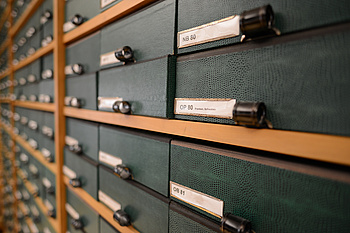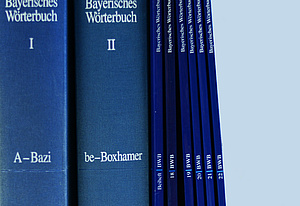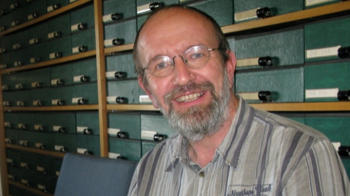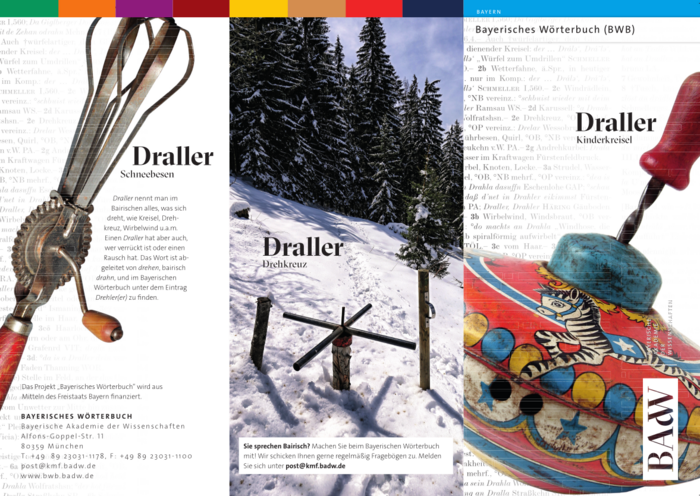
The Project: a Dictionary of the Bavarian Vernacular
The area covered by the Dictionary of Bavarian Dialects (Bayerisches Wörterbuch) comprises Upper Bavaria, Lower Bavaria, the Upper Palatinate and neighbouring regions of Bavarian Swabia, Middle Franconia and Upper Franconia. Over and above the vernaculars spoken today, Bavaria’s literary tradition since its beginnings in the 8th century is also taken into account.
The Dictionary of Bavarian Dialects is a basic research project of the Bavarian Academy of Sciences and Humanities (Bayerische Akademie der Wissenschaften BAdW). Following the restructuring of the institution in 2015, research groups previously called “commissions” have been renamed “projects”. Today a committee of seven members heads the project „Bayerisches Wörterbuch“. A Scientific Board with 13 members supports and advises the committee.
The research group comprises four scientists and one secretary (see people). A former retired colleague still works with the project on a voluntary base.
The Collection

Starting in 1913, language material was collected from all Bavarian-speaking regions in Bavaria. Questionnaires were sent out to local informants throughout Bavaria, and contemporary and historical literary sources were excerpted. Today the collection comprises around nine million dialect examples. With the exception of the “Wörterlisten” (word lists), which can be digitally searched and edited, this material consists of index cards, to which corresponding standard German or quasi-standard German keywords have been added, filed alphabetically (see Collecting the Material).
The Publication

The Dictionary of Bavarian Vernacular has been published since 1995, with one or two fascicles annually. Eight to nine fascicles together make up a volume. The project aims to publish a total of ten to twelve volumes, three volumes have already been published as well as the index of the dictionary (see Publications).
Until issue 23 came with an eight-page publication titled “Goggolori”. “Goggolori” offers easily digestible articles covering various topics of Bavarian vernacular research, an entertaining “extra”, also much appreciated beyond the expert audience by people generally interested in Bavarian vernacular (see Goggolori).
The Bayerisches Wörterbuch goes digital
A large part of the Dictionary of Bavarian Vernacular collection, the so called „Wörterlisten“ (word lists), was scanned in 2016 and stored in a database. The IT department of the Bayerischen Akademie der Wissenschaften (BAdW) developed tools tailored to the requirements of the dictionary editors (see Digital Platform). The time-consuming manual excerption of the lists is now being replaced by fast and comfortable use of computers and displays. These tools have the further advantage of making the material available for linguistic research as well as simply for people interested in Bavarian vernaculars.
The plan is to publish the volumes of the Bayerisches Wörterbuch not only in printed form but also on an online platform. To this end, the published volumes will need to be specially redacted in order to add functional search criteria.
Growing Public Interest in Bavarian Vernacular

As the public has become more and more interested in Bavarian vernacular, the editors of the Bayerisches Wörterbuch have increasingly engaged with the public media (see News). Since 2008, project director Professor Anthony Rowley has appeared as a regular on „Host mi?“, part of the show „Wir in Bayern” transmitted by Bavarian Television (Bayerisches Fernsehen). This word-guessing game is much appreciated by an ever-growing audience.
Funding
The Bayerische Wörterbuch is a project of the Bavarian Academy of Sciences and Humanities (Bayerische Akademie der Wissenschaften), funded by the Free State of Bavaria.

